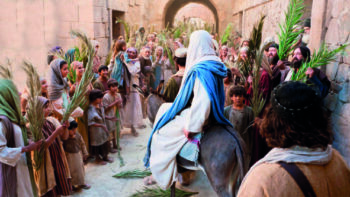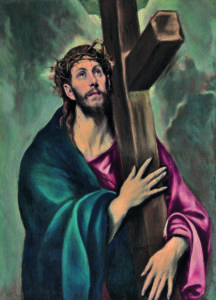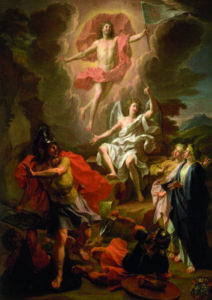A Brief History of Holy Week
Easter spells out beauty, the rare beauty of new life. S.D. Gordon
Without the resurrection, Christianity would be so much wishful thinking, taking its place alongside all other human philosophy and religious speculation. John MacArthur
We cannot give up in the face of evil. God is Love and he has defeated evil through Christ’s death and resurrection. Pope Francis
In many churches, the week before Easter is called ‘Holy Week,’ the last week of the forty-day season of Lent. In Holy Week we focus on the last week of Christ's life, remembering especially his suffering and resurrection.
 Palm Sunday
Palm Sunday
This was a high point in Jesus’ life and ministry -- see Matthew 21:8-9. Just as an American president is greeted by crowds waving American flags, Jesus was greeted by enormous crowds waving palms cut from nearby trees. The New Testament welcoming crowd was our equivalent of a parade for returning heroes. On Palm Sunday Jesus was treated as a great dignitary. However, fame is fleeting. In less than a week, Jesus was abandoned by everyone, including his own disciples.
Holy Monday and Tuesday
The cleansing of the temple at Jerusalem seems to have taken place on Holy Monday. It is also the day when Jesus reprimanded the moneychangers.
Holy Tuesday is the day when the famous incident between Jesus and the Pharisees supposedly took place where an attempt was made to get Jesus to commit blasphemy by asking him, “Teacher, which is the greatest commandment in the Law” (Matthew 22:34-40). The Pharisees were Jesus’ harshest critics, claiming he broke Sabbath laws by healing people, and gleaning corn to eat (Luke 13:14, Matthew 12:1-2).
Spy Wednesday
On this day, Judas Iscariot, an apostle of Jesus who betrayed him, told the chief priests where they could find Jesus. The betrayal of Jesus by Judas is reported in Matthew 26:14-16: “Then one of the Twelve - the one called Judas Iscariot - went to the chief priests and asked, ‘What are you willing to give me if I hand him over to you?’ So, they counted out for him thirty silver coins. From then on Judas watched for an opportunity to hand him over.”
Maundy Thursday
The word ‘Maundy’ comes from the Latin word ‘mandatum,’ meaning mandate or commandment. It was on Thursday that Jesus gave us a new commandment: “A new command I give you: Love one another. As I have loved you, so you must love one another. By this all will know you are my disciples, if you love one another.”
Good Friday
In one sense, ‘Good Friday’ is a misnomer because, in a sense, it was really a ‘bad’ Friday - the crucifixion day of Jesus. Originally the day was called ‘God’s Friday,’ which somehow was lengthened into Good Friday.
Some, however, hold to the view that ‘Good Friday’ refers to the good gift of salvation brought about by the death and resurrection of Jesus.
Commenting on Good Friday, New Testament scholar William Barclay says: “Love always involves responsibility, and love always involves sacrifice. And we do not really love Christ unless we are prepared to face his task and to take up his Cross.”
Similarly, William Penn, the Quaker founder of Pennsylvania, observed: “No pain, no palm; no thorns, no throne; no gall, no glory; no cross, no crown.”
Holy Saturday
Until the fourth century, only Easter Sunday was recognised as a holy or special day. During the fourth century, all the days of the week prior to Easter were established as holy days. Some Churches reserve Holy Saturday as a traditional time for baptisms.
Spanish archbishop Isidore of Seville recommended Christians spend this night in prayer: “We spend the night before Easter in vigil because of the coming of our King and Lord, so that when the time of his resurrection comes, we may be found awake, and not sleeping.”
Easter Sunday
The day of Christ’s resurrection, this is the most important day of the Church year. The date varies from year to year because the Council of Nicaea (325) determined that Easter would be celebrated on the Sunday following the first full moon after the vernal equinox. (There are two times during the year when the length of day and night are equal: the vernal equinox and the autumnal equinox). The word ‘Easter’ is probably derived from the Goddess of Spring, Eostre. Many congregations hold an Easter sunrise service. This comes from the fact that “Mary Magdalene and the other Mary” first learned of Christ’s resurrection “at dawn on the first day of the week” (Matthew 28:1).
Holy Week events are incorporated in this inspirational prayer written by British clergyman, Jeremy Taylor (1613-1667): “Grant, O Lord, that in your wounds I may find my safety, in your stripes my cure, in your pain my peace, in your Cross my victory, in your resurrection my triumph, and a crown of righteousness in the glories of your eternal kingdom.”



 Entries(RSS)
Entries(RSS)